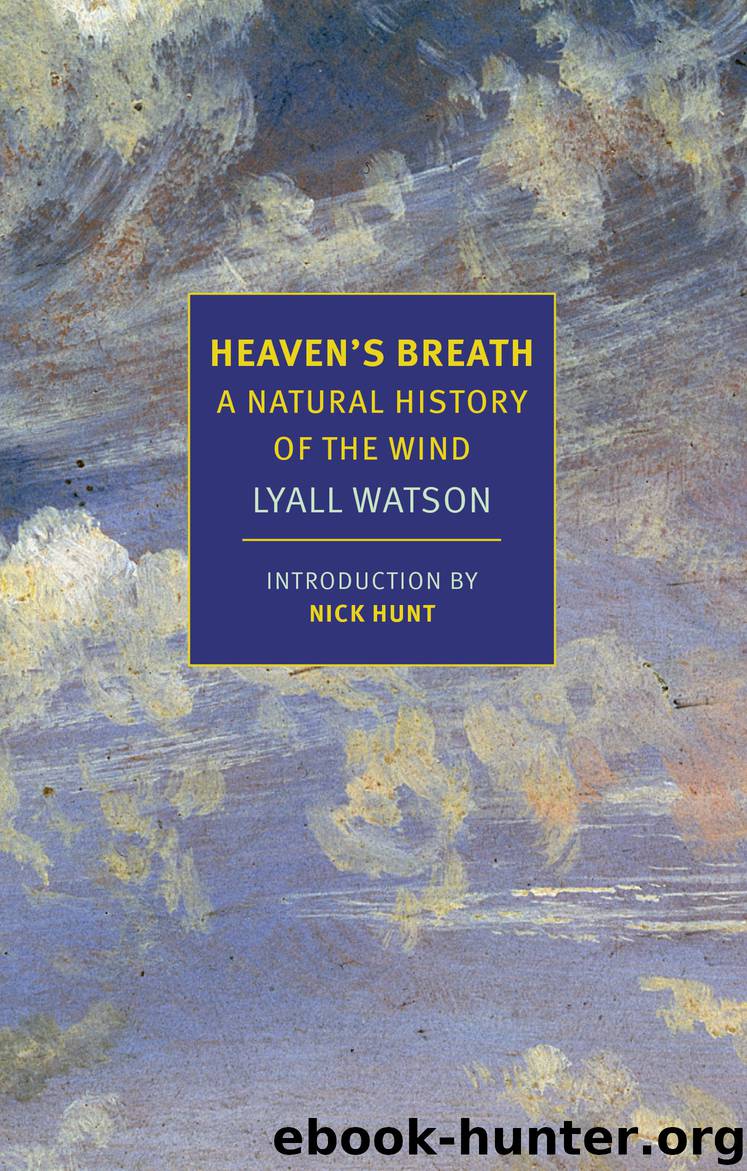Heaven's Breath by Lyall Watson

Author:Lyall Watson
Language: eng
Format: epub
Publisher: New York Review Books
Published: 2019-08-13T12:27:20+00:00
PART FOUR
Wind and Body
We are air conditioned.
Every adult has around two square metres of skin in contact with surrounding air. And, in turn, surrounds a roomful of it each day with eighty square metres of tissue that line our lungs.
We can survive for twenty-four hours on just fifteen cubic metres of air in a small closed room, but it would be very uncomfortable for at least half of that time. In practice, because of our own motion and the movement of air past us on the wind, we come each day into contact with at least enough air to fill a large auditorium. And, even without travelling at all, the chances are that on a day with a pleasant breeze, some of this air will be from over 300 kilometres away, or will have come tumbling in on a downdraught from somewhere close to the stratosphere.
We live in the stream of Gaian breath and what touches her, touches us and changes us.
Awareness of this fact is nothing new. Five thousand years ago in the reign of Emperor Huang Ti, the art of feng shui, which involves the sacred principles of wind and water, was already being practised in China. Houses, gardens, beds and tombs were located and aligned in a landscape so as to enjoy the maximum benefits provided by the quality of air and the shape of the land. For, it was believed, human nature was strongly influenced by such surroundings.
Two thousand years later, Susruta – the first recorded Indian physician – compiled his Ayur Veda, a compendium of the effects of the seasons on humans and animals, recommending a retreat in summer to cooler, drier climates in the hills.
His concern is echoed still further west by the Greek poet Hesiod, who quoted rural precepts which spoke in praise of the south, west and northerly winds, but had nothing good to say about the east wind which ‘bursts upon the misty force of the open sea, bringing heavy distress to mortal men’. He admonishes his brother Perses to ‘Beat this weather!’ and ‘Get on homeward before the darkening cloud from the sky can gather about you.’
In the sixth century BC, the philosopher Anaximenes suggested that air was the foundation of everything in the universe and affected all living things directly by its concentration or dilution. A century later, Empedocles extended this stark chemistry to include water, earth and fire, creating a four-square cosmology which continues to influence the way we think. We speak still of ‘raging elements’, when what we mean is air and water being lashed into fury by storm.
The Greeks recognised Asclepios, ‘of the clear bright radiant air after a storm’, as the god of healing and established temples or Asclepeions in which priest-physicians practised their arts. One of these early clinics at Knidos concentrated on ‘treating the disease’ and is the spiritual source of much modern medicine and its preoccupation with killing germs. But there was another clinic on the island of Kos which believed in ‘treating the patient’, and it was this one that, in the fifth century BC, produced Hippocrates.
Download
This site does not store any files on its server. We only index and link to content provided by other sites. Please contact the content providers to delete copyright contents if any and email us, we'll remove relevant links or contents immediately.
How to Do Nothing by Jenny Odell(2658)
A Forest Journey by John Perlin(2597)
The Plant Messiah by Carlos Magdalena(2468)
Babylon's Ark by Lawrence Anthony(2081)
Energy Myths and Realities by Vaclav Smil(2075)
The ESV Study Bible by Crossway Bibles(1989)
Abbey in America by Murray John A(1815)
Fatal Storm by Rob Mundle(1795)
Witness Tree by Lynda V. Mapes(1700)
Shadows on the Gulf by Rowan Jacobsen(1522)
Client Earth by James Thornton(1514)
Brokeback Mountain by Annie Proulx(1478)
Coming Back to Life by Joanna Macy(1472)
Water Rights and the Environment in the United States by John Burch(1420)
Cosmos by Carl Sagan(1412)
Ten Billion by Stephen Emmott(1389)
Mycelium Running: How Mushrooms Can Help Save the World by Paul Stamets(1300)
The overachievers by Robbins Alexandra(1290)
The Uninhabitable Earth by David Wallace-Wells;(1199)
